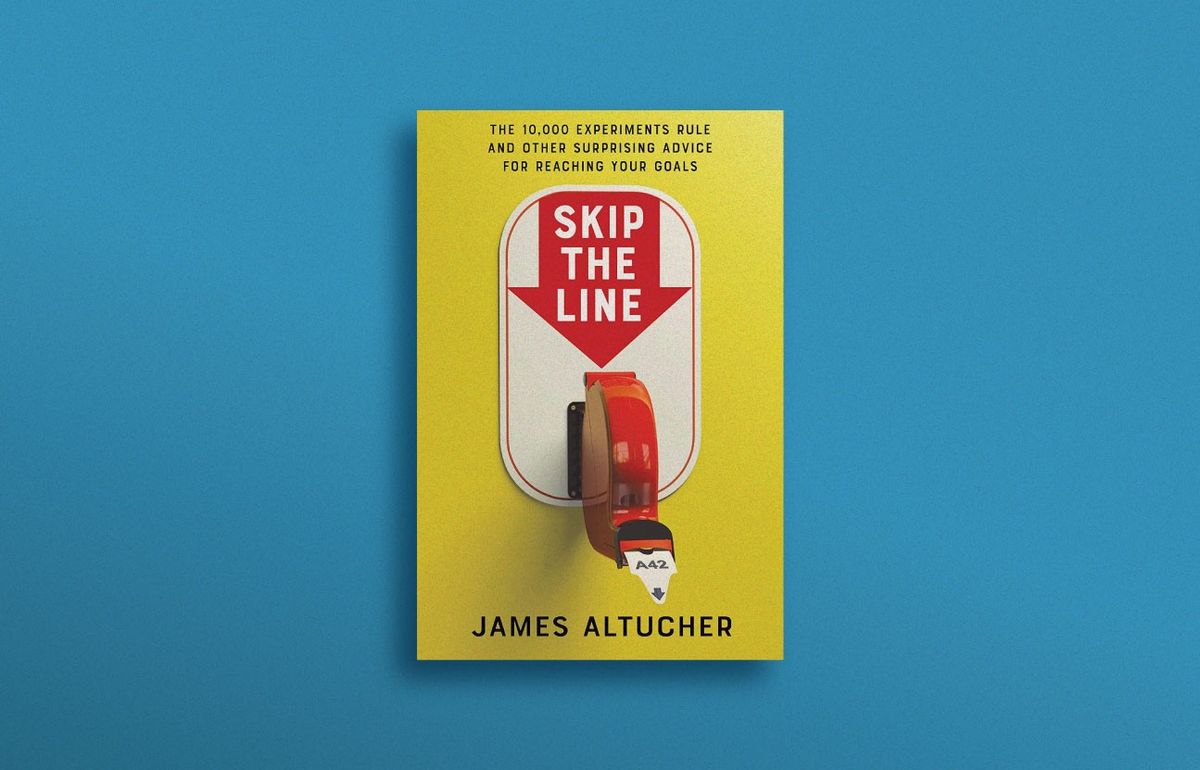This book gives you the principles to succeed sooner in life.
Chapters 1 - 4
Think of an idea about business, investing, relationships, fitness, or diet that is low-risk and high-reward. Then do experiments that are low in cost and time.
- Example: Think of an app idea. Create a “spec”—simply put, it’s your app idea written down. Then go to freelancer.com and find a programmer who can do it. If your idea is bad or doesn’t work, the programmers will tell you. You can do all of this in an hour and if it doesn’t work it doesn’t cost anything. You learn a lot from the process of doing it.
- James says that there is no failure—only learning or success.
Note: The following is not from Skip the Line, but the information is relevant.
Create a system for easily testing product ideas. If you’ve never done Facebook or YouTube ads, it will seem daunting so you won’t do it. Same for websites, if you’ve never made one before it seems difficult. So the first thing you should do is learn how to make a website and how to run ads. Then any time you have a business idea, you can post an ad and see if there’s demand.
In the Personal MBA, Josh Kaufman outlines the 5 essential parts of every business: value creation, marketing, sales, value delivery, and finance. The easiest way to practice is with online businesses. There are many companies and tools to make it easy.
- Value creation is a product or service. We practice this by thinking of products and services people may want.
- Marketing is social media ads. We practice this by learning about Facebook and YouTube ads. Advanced marketing is becoming friends with influencers and sending them your product for free in hopes that they promote it. Or getting influencers to do affiliate marketing. Give them 70% of the profits.
- Sales is making a website (landing page) and writing copy that sells. We can practice this by making a website and writing copy. You need to find a service that can handle payments for you (like Shopify).
- Value delivery is getting the product to your customer. If it is a digital product, that’s easy. You can set up a store on Shopify or a similar service and they will automatically give a download link to the customer after payment.
- Finance is looking at how much money the business makes and determining if it’s worthwhile to continue.
- Practice these 5 steps so that any time you have a business idea, you know how to quickly and easily test it. The experiment is really only 3 steps: Make Facebook ads; then make a website that automatically takes people’s money and gives them the product; then make the product if there is enough demand. To reduce startup costs, use Gumroad (it’s free) instead of Shopify. For each idea, spend a couple of hundred dollars running Facebook ads that link to a Gumroad sales page. Most ideas will fail but think of it more as a learning experience. (And if it succeeds, you could make millions.)
Chapters 5 & 6
Skills have different micro-skills that overlap. Develop micro-skills that help you in many different skills. Best micro-skills: speaking, reading, writing, and computer skills.
- “It takes 10,000 hours to be world-class at any one thing. It takes 1,000 hours to be world-class at an intersection. It takes 100 hours to become world-class at the intersection of three or more things. And if you use experiments to quickly try out these combinations of ideas, determining which directions will be successful and which ones won’t can go even faster.”
- Decision-making is essential. Reading great books makes you better at decision-making.
Chapter 7
Have mentors, peers, and students. All of them help you learn something new. Have virtual mentors too (watch their videos/podcasts).
Chapters 9 & 10
Think of 10 ideas a day about anything. Business ideas, relationship ideas, health ideas, knowledge ideas. Then combine the ideas.
This article by James explains how to have great ideas.
Ideas for ideas:
- Combine something old with the new
- 10 book ideas I could do
- 10 experiments I could do today that would lead to businesses
- 10 jokes
- 10 business ideas for Google, Apple, or yourself
- 10 people you can send ideas to
- 10 blog ideas
- 10 tweet ideas
- 10 online course ideas
- 10 businesses that I can remove the middle man
- 10 AI businesses I could make
- 10 things I disagree with most other people about
- 10 people I want to be friends with. 10 ways to meet them
- 10 things I learned yesterday
- 10 things I learned from X, where X is a friend, author, etc that I recently talked to or read
- 10 things I’m interested in getting better at
- Break ideas down into parts within parts
“People say, “Execution is everything.” I can tell you it isn’t. If you can’t come up with ideas, then you’ll never be able to come up with execution ideas.”
Execution = ideas + experimentation
“When I had an idea to create a social networking website for people interested in investing, the next thing I did was come up with “Ten Ideas for Pages on the Website.” Then “Ten Things on Each Page.” Then “Ten Ways I Can Execute on This.” All of these were subsets of the initial idea. Two months after I developed that original list I had the first version of the website completed. Two months after that I officially announced the website. And four months later I sold the website for millions to TheStreet.com.”
“Many people don’t understand that execution is a spectrum. You can be bad or good. The way you get good at execution is having good execution ideas. The way to get good at execution ideas is to exercise your idea muscle. When you have an idea, there are many possible ways to execute on that idea. It’s like opening a mystical third eye: you can see all the possible futures and choose the best one. And how do you know which one is best? You guessed it: by experimenting.”
You need a strategy for life: Just having a simple strategy can make you way better than average people. In Scrabble, for instance, you can easily beat any player if you have this strategy: memorize all the two-letter words that have high-value letters, like “xu,” “qi,” and “za.” Also, memorize the words that have a “q” but no “u” like “qat,“ “qoph,” and “qanat.”
Life is a lot more complicated than Scrabble, so it takes longer to learn the rules and develop a strategy, but once you do you will be successful. The best strategies are in books.
Chapter 14
The 50/1 rule (the 80/20 rule applied twice): 50% of the benefits come from 1% of your work. The hard part is figuring out which part that is. (It’s leveraged decision making.)
- 64/4 rule -- the next level of 80/20 80%x80%=64% and 20%x20%=4%. 4% off the work can get you 64% off the benefits if you can figure out the essential tasks.
- 50/1 rule -- the next level: 1% of your work creates 50% of the value. (This is probably leveraged decision making + concentration (as opposed to diversification in investing).
Chapter 17
Working a job is the slow path to success. Being an entrepreneur will teach you far more.
Chapter 18
Relationships:
- If you have a good relationship with someone, maintain it. The best new customers are old customers. The best new podcast guests are old podcast guests.
- Remove toxic people from your life.
Communication:
- Negotiation, networking, the google technique, yes and...
- Only get information from books – no news, social media, etc.
- Understand that everyone gets rejected, it's normal.
Productivity:
- The average person spends 26 minutes a day looking for new jobs and they only get 3 hours of productive work done a day.
- The average person thinks that chess masters are smart but it doesn't take that much work to get there. What else can you do to make people think you're good even though it doesn't take long?
Chapter 19
Spoke and wheel: you develop one core idea and then repurpose it onto every other platform: Social media, blog, book, podcast, online course, etc.
- E.g., you write a book but you post each chapter as a blog post. Then you adapt that blog post into a Tweet, YouTube video, etc. After you have enough blog posts to complete the book, you turn it into an online video course.
Chapter 20
Billion-dollar business ideas:
- The access economy. Ex) Uber and Airbnb
- Artificial intelligence.
- A “bottom third” business. Everyone is competing for the top third of customers. Better to be the only one serving the bottom.
Chapter 21
Summary of Nassim Taleb’s books:
- Don’t mistake your luck and good fortune for skill.
- Black swan events are possible—get insurance for them.
- Become anti-fragile: improve from stress—rather than being robust or fragile.
- Think in bets—would you still hold your beliefs if you had to bet money on them?
Chapter 23
Life rules:
- Always go to the place least crowded. Success is found where nobody else is.
- READ! “You are so lucky. Most people don’t read. Those people are losers. If you read one good thing a day, then in a few years you’ll know thousands more things than anyone else.”
- Don’t read the news.




Comments ()